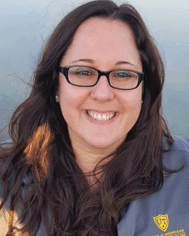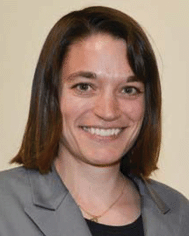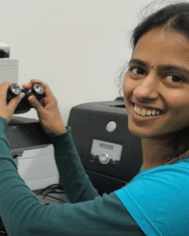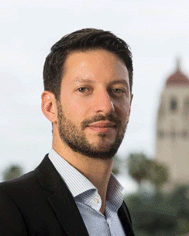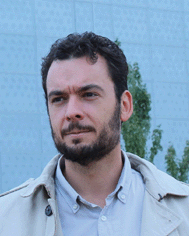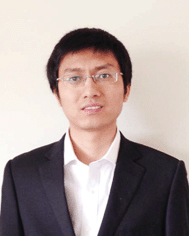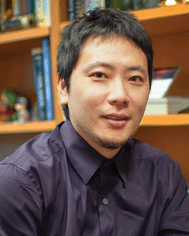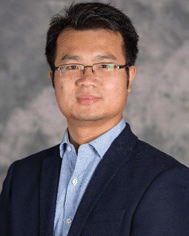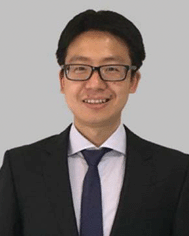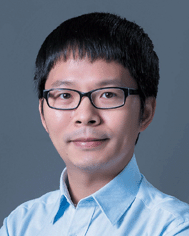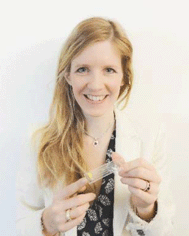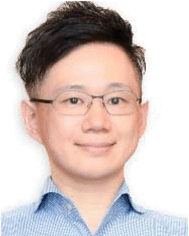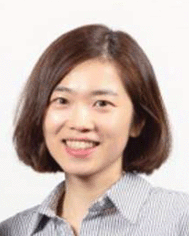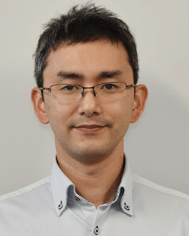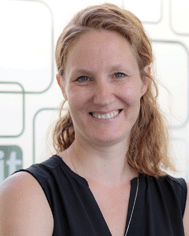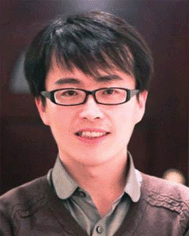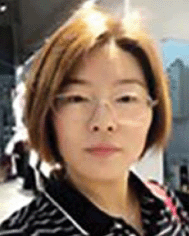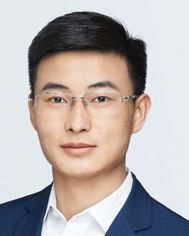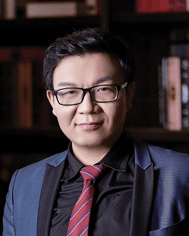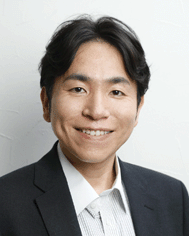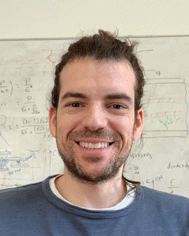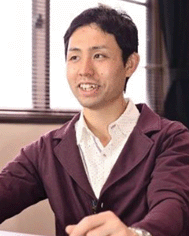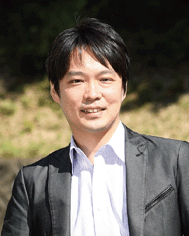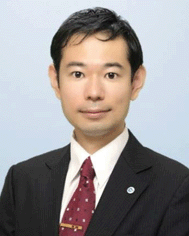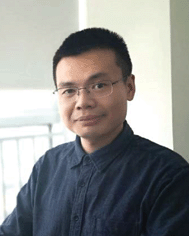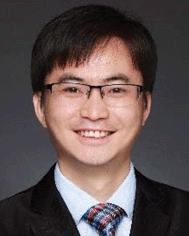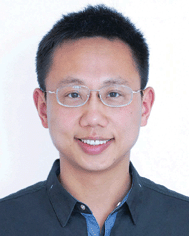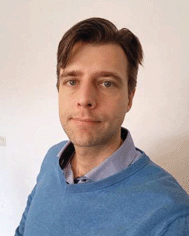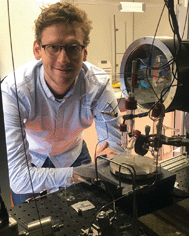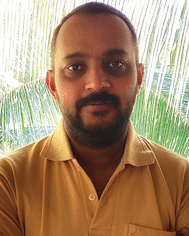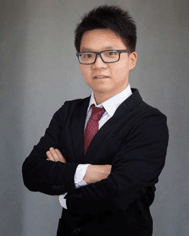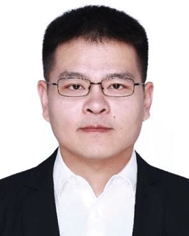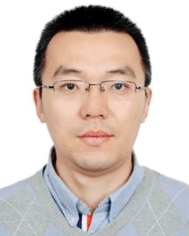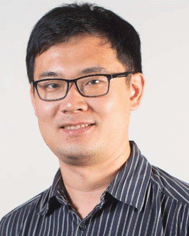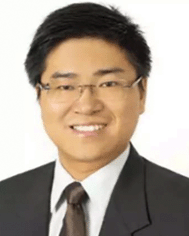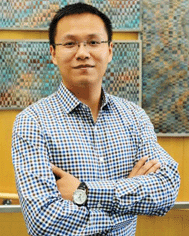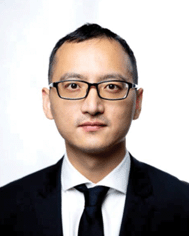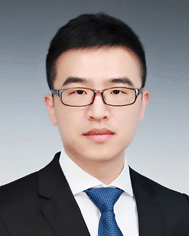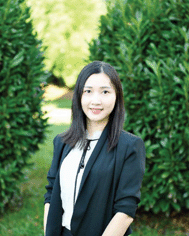DOI:
10.1039/D1NR90087K
(Profile)
Nanoscale, 2021,
13, 8680-8692
Nanoscale profiles: contributors to the Emerging Investigators 2021 issue
Abstract
Our 2021 Emerging Investigators themed issues gather some of the best research being conducted by scientists in the early stages of their independent career. Each contributor was recommended as carrying out work with the potential to influence future directions in nanoscience. Congratulations to all of the researchers featured in our first Nanoscale Emerging Investigators collection, we hope you enjoy reading this issue.
Dr Ana C. Alba-Rubio is an Assistant Professor in the Department of Chemical Engineering at the University of Toledo. She received a bachelor's degree in chemical engineering from the University of Málaga, Spain, in 2007. She then moved to the Institute of Catalysis and Petrochemistry (CSIC) in Madrid, Spain, to pursue her doctoral studies. After completing her postdoctoral stage at the University of Wisconsin–Madison, she joined the University of Toledo as a faculty member in 2015. Her current research interests involve the rational design and synthesis of nanomaterials for catalysis and sensing applications, with a particular interest in producing fuels and materials sustainably and improving the human condition.
Her contribution to the 2021 Nanoscale Emerging Investigators collection can be read at DOI: 10.1039/D1NR00015B
Dr Esther Amstad studied material science at ETH in Zurich where she also carried out her PhD thesis on the steric stabilization of iron oxide nanoparticles. She completed a postdoc at Harvard University where she developed new microfluidic devices to study early stages of the crystallization of nanoparticles and to produce drops of well-defined sizes at high throughputs. In 2014, she joined the École Polytechnique Fédérale de Lausanne (EPFL), Switzerland, as a Tenure Track Assistant Professor in the Institute of Materials, where she heads the Soft Materials Laboratory (SMAL). Inspired by nature, her research team introduces drop-based processes to fabricate adaptable strong and tough granular materials.
Her contribution to the 2021 Nanoscale Emerging Investigators collection can be read at DOI: 10.1039/D0NR08351H
Dr Milena Arciniegas is a very active female scientist with a solid expertise in material science and technology. Since 2018 she has led a highly motivated and young research team at IIT that seeks to understand and discover fascinating properties of emitting layered structures for non-conventional applications. She also currently leads the tasks of data management and the use of machine learning for the design of novel layered materials within the Nanochemistry research line at IIT.
Her contribution to the 2021 Nanoscale Emerging Investigators collection can be read at DOI: 10.1039/D0NR08043H
Dr Nicholas Bedford is a Senior Lecturer at the School of Chemical Engineering at the University of New South Wales and a member of the Particle and Catalysis Research Group, where he started his independent academic career in 2018. His research team is focused on broadly solving the “structure/function relationships” problem for nanoscale materials through novel synthetic capabilities and synchrotron radiation characterization methods. Prior to joining UNSW, Dr Bedford was a research scientist at the US Air Force Research Laboratory, where he also held a National Research Council Postdoctoral Fellowship after graduating with his PhD in Material Science from the University of Cincinnati.
His contribution to the 2021 Nanoscale Emerging Investigators collection can be read at DOI: 10.1039/D0NR07068H
Dr Radha Boya is a Royal Society University Research Fellow and Chair (Hon.) in Nanoscience at the Department of Physics & Astronomy and the National Graphene Institute, at the University of Manchester. After completing her PhD in India, Radha secured a series of highly prestigious international fellowships which enabled her research career in the UK. Her primary research interest relates to the ultimately narrow angstrom-scale confined channels made by effectively removing a single atomic plane from a bulk layered crystal, and selective molecular transport of ions, gases and water through them. She was honoured with the RSC Marlow award, is a L'Oréal-UNESCO For Women in Science UK fellow, International Rising Talent, and is included as an inventor in the MIT Technology Review's “Innovators under 35” global list.
Her contribution to the 2021 Nanoscale Emerging Investigators collection can be read at DOI: 10.1039/D1NR00001B
Dr Matteo Cargnello received his Ph.D. in Nanotechnology in 2012 from the University of Trieste (Italy) and he was then a postdoctoral scholar at the University of Pennsylvania (Philadelphia) before moving to Stanford University in January 2015. He is currently Assistant Professor of Chemical Engineering and, by courtesy, of Materials Science and Engineering, and Terman Faculty Fellow. General research goals in his group pertain to solving energy and environmental challenges using uniform and tailored nanocrystals and nanostructures. Emphasis is on how to precisely control catalyst structure to understand and exploit interactions between well-defined building blocks.
His contribution to the 2021 Nanoscale Emerging Investigators collection can be read at DOI: 10.1039/D0NR07960J
Dr Andres Castellanos-Gomez is a Research Scientist at the Spanish National Research Council (Consejo Superior de Investigaciones Científicas, CSIC). He explores novel 2D materials and studies their mechanical, electrical and optical properties with special interest on the application of these materials in nanomechanical and optoelectronic devices. Among other recognitions he has been appointed Fellow of the International Association of Advanced Materials (IAAM) in 2020, has been included in the Highly Cited Researchers 2018, 2019 and 2020 lists of Clarivate/WOS and has been also recognized with the Young Researcher Award (experimental physics) of the Royal Physical Society of Spain (2016).
His contribution to the 2021 Nanoscale Emerging Investigators collection can be read at DOI: 10.1039/D0NR06036D
Dr Arun Richard Chandrasekaran was born and raised in Madurai, India, where he spent most of his days playing cricket (science came later). His academic path has taken many turns, from a Bachelor's degree in Zoology to Master's in Nanoscience to a PhD in Chemistry. Arun's research focusses on “making things with DNA”, with potential use in drug delivery and biosensing. Arun likes to communicate science to the lay audience, and uses pop-culture references in his presentations and research papers to do so (including this one). Apart from doing science, Arun likes to sing (tenor), is a published poet, and is a huge fan of horror movies.
His contribution to the 2021 Nanoscale Emerging Investigators collection can be read at DOI: 10.1039/D0NR05846G
Professor Lingqian Chang obtained his PhD in Biomedical Engineering from Ohio State University, followed by postdoc training in the CCNE nanoscale center at Northwestern University. He used to be an assistant professor at University of North Texas. Currently he is a full professor at Beihang University, and founded The Institute of Single Cell Engineering. His research is mainly focused on cellular micro-/nano-technologies, aiming to design novel nanochips and nanosensors for gene detection and cell therapy in live cells. He has published more than 50 peer-reviewed papers, 1 book, 3 book chapters and holds 5 Chinese Patents and 3 US Patents.
His contribution to the 2021 Nanoscale Emerging Investigators collection can be read at DOI: 10.1039/D0NR07478K
Dr Jun Chen is currently an assistant professor in the Department of Bioengineering at the University of California, Los Angeles. His research focuses on smart textiles, wearables and body area networks. With a current h-index of 70, his research is recognized by the 2020 Altmetric Top 100, Top 10 Science Stories of 2020 by Ontario Science Centre,
ACS Nano Rising Stars Lectureship Award, Frontiers in Chemistry Rising Stars,
Nanoscale Emerging Investigator Award, Okawa Foundation Research Award, TenCate Protective Fabrics Award, Highly Cited Researchers 2020/2019 in Web of Science, and many others. He is an associate editor of
Biosensors and Bioelectronics.
His contribution to the 2021 Nanoscale Emerging Investigators collection can be read at DOI: 10.1039/D0NR07770D
Professor Ou Chen obtained his B.S. degree in Chemical Physics from the University of Science and Technology of China (USTC) in 2004 and completed his PhD study at the Department of Chemistry, University of Florida in 2010. Then, he worked as a postdoctoral associate at MIT on the design and synthesis of semiconductor quantum dot nanocrystals for various applications. After postdoctoral training, he started his independent career as an assistant professor at Brown University in 2015. His current research focuses on exploring novel semiconductor quantum dots, heterostructure nanomaterials, perovskite nanocrystals and their assembled superstructures for catalysis and energy-related applications. He is a recipient of the Sloan Research Fellowship award, Camille Dreyfus Teacher-Scholar award and NSF CAREER award.
His contribution to the 2021 Nanoscale Emerging Investigators collection can be read at DOI: 10.1039/D0NR06771G
Dr Zheng Chen is an assistant professor at the Department of NanoEngineering, Chemical Engineering and Materials Science Programs at University of California San Diego (UCSD). He received his B.S. from Tianjin University (2007) and Ph.D. from University of California Los Angeles (2012), both in Chemical Engineering. Then he served as a postdoctoral researcher at Stanford University before joining UCSD in 2016. His research group, the Sustainable Materials and Energy Laboratory (SMEL), mainly focuses on the design and understanding of novel molecules, nanostructured materials, functional polymers and their hybrid materials for energy storage and conversion.
His contribution to the 2021 Nanoscale Emerging Investigators collection can be read at DOI: 10.1039/D0NR08305D
Dr Wei Cheng is currently an associate professor in the Department of Materials Science and Engineering at Xiamen University in China. He received his Ph.D. in materials science in 2016 from the Swiss Federal Institute of Technology in Zurich (ETH Zurich). After working as a postdoctoral research fellow at the University of British Columbia (UBC) in Canada, he joined Xiamen University as a principle investigator in 2019. His research interests are focused on synthesis, assembly and application of inorganic nanomaterials.
His contribution to the 2021 Nanoscale Emerging Investigators collection can be read at DOI: 10.1039/D0NR09236C
Dr Stacy Copp is an Assistant Professor of Materials Science and Engineering and of Physics at the University of California, Irvine. She received her PhD in Physics from UC Santa Barbara in 2016 with Prof. E. Gwinn and was then a Distinguished Postdoctoral Fellow and L'Oreal USA for Women in Science Fellow at Los Alamos National Laboratory until 2019. She now leads the Soft Matter Photonics Research Group at UCI, harnessing self-assembly of DNA and other macromolecules to create novel optical materials.
Her contribution to the 2021 Nanoscale Emerging Investigators collection can be read at DOI: 10.1039/D0NR08300C
Dr Mita Dasog is an Assistant Professor in the Chemistry Department at Dalhousie University. She obtained her doctoral degree from the University of Alberta in 2014 and completed her postdoctoral work at California Institute of Technology. Her research group focuses on the synthesis and application of catalytic and plasmonic nanomaterials.
Her contribution to the 2021 Nanoscale Emerging Investigators collection can be read at DOI: 10.1039/D0NR07463B
Dr Cecilia de Carvalho Castro Silva has been an assistant professor at MackGraphe – Graphene and Nanomaterials Research Center, Mackenzie Presbyterian University, São Paulo (Brazil) since 2016. She obtained her PhD in Chemistry from the University of Campinas (Unicamp), Campinas (Brazil) in 2015. She was included by Forbes-Brazil in the list “30 Under 30”, of the 30 most talented youngsters under 30 years in 2016. Her research interests are dedicated to exploring two-dimensional materials’ architectures in the development of (bio)sensing and optoelectronics technologies. Cecilia advocates for women in science and believes in the use of science as a tool of social change!
Her contribution to the 2021 Nanoscale Emerging Investigators collection can be read at DOI: 10.1039/D0NR08380A
Dr Xuemin Du is a full Professor and a group leader at Shenzhen Institute of Advanced Technology (SIAT), Chinese Academy of Sciences (CAS). He received two Ph.D. degrees (2012) from University of Science and Technology of China and City University of Hong Kong. He was awarded with “Member of Youth Innovation Promotion Association, CAS”, “Guangdong High-level Personnel of Special Support Program-Outstanding Young Scholar in Science and Technology Innovation”, and “Shenzhen Oversea High-Caliber Personnel”. His research interests cover mainly bio-inspired smart materials and adaptable biodevices, such as smart polymers, photonic crystals, soft actuators, flexible electronics, neural interfaces and tissue engineering.
His contribution to the 2021 Nanoscale Emerging Investigators collection can be read at DOI: 10.1039/D0NR07907C
Dr Sofiane El-Kirat-Chatel completed his PhD in microbiology-immunology at the University of Bordeaux in 2011. Then, during his postdoc at UCLouvain he used nanotechnologies to address biological questions. During this stay, he used and developed advanced atomic force microscopy methods to decipher microbial surface properties at high resolution (single-cell and single-molecule scales). Since 2016, Sofiane is a CNRS researcher at Nancy and he takes advantage of his multidisciplinary profile to better understand the molecular mechanisms governing microbial cell surface properties and to create innovative antibiofilm surfaces.
His contribution to the 2021 Nanoscale Emerging Investigators collection can be read at DOI: 10.1039/D0NR07492F
Professor Inge Herrmann obtained her BSc, MSc and PhD in chemical and bioengineering from ETH Zurich. Following postgraduate training at University Hospital Zurich, the University of Illinois and Imperial College London, she joined the Swiss Laboratory for Materials Science and Technology (Empa) as a principle investigator in 2015 and ETH Zurich in 2019 where she is heading the Nanoparticle Systems Engineering Laboratory (http://www.nse.ethz.ch) in the Department of Mechanical and Process Engineering. Her interdisciplinary research group develops nanotechnological solutions for healthcare. She has won several prestigious awards, including the Bayer Healthcare Award, the Johnson & Johnson Award and the Swiss National Science Foundation Eccellenza Fellowship.
Her contribution to the 2021 Nanoscale Emerging Investigators collection can be read at DOI: 10.1039/D0NR08285F
Dr Kirsten M. Ø. Jensen is an associate professor at Department of Chemistry at University of Copenhagen. She received her Ph.D. in Chemistry from Aarhus University in 2013, and following a postdoc position at Columbia University, she started her research group in Copenhagen in 2015. The research in her group is concerned with nanomaterials, focusing especially on the use of X-ray and neutron scattering for structural studies of nanoparticles. The work in her group covers nanoparticle synthesis, studies of atomic scale structure, as well as the development of methods for analysis and modelling of scattering data.
Her contribution to the 2021 Nanoscale Emerging Investigators collection can be read at DOI: 10.1039/D0NR08299F
Dr Ryota Kabe is currently an Assistant Professor at Okinawa Institute of Science and Technology Graduate University (OIST). He received his BS from Kansai University, MS from Osaka University, and Ph.D. from Kyushu University (2010). After working as a postdoctoral fellow at Bowling Green State University, Max Planck Institute for Polymer Research, and Kyushu University, he joined Kyushu University as an assistant professor and worked with Prof. Chihaya Adachi. In 2019, he moved to OIST. His research interests include the control of organic exciton dynamics and their application in optoelectronics.
His contribution to the 2021 Nanoscale Emerging Investigators collection can be read at DOI: 10.1039/D0NR09227D
Professor So Youn Kim is an Associate Professor of Energy and Chemical Engineering at Ulsan National Institute of Science and Technology (UNIST). She received a Ph.D in Chemical Engineering at the University of Illinois at Urbana-Champaign in 2011 under the supervision of Charles F. Zukoski. She worked as a postdoctoral research associate at Princeton University from 2012 to 2014 with Richard A. Register. Her research interest lies in understanding fundamental interactions in soft materials from the molecular level and relating to the bulk state properties. Current research focuses on the microstructure of polymer nanocomposites, interfacial dynamics at the polymer/particles, the self-assembling nature of block copolymers and the dispersion stability of graphene oxide solutions, employing various scattering experiments.
Her contribution to the 2021 Nanoscale Emerging Investigators collection can be read at DOI: 10.1039/D0NR07858A
Dr Yoichi Kobayashi received his PhD from Kwansei Gakuin University in 2011 with Prof. Naoto Tamai on muliexciton properties of semiconductor nanocrystals. He was a postdoctoral researcher with Prof. Gregory Scholes at the University of Toronto, working on ultrafast charge separations of semiconductor heteronanostructures and conjugated polymers. In 2013, he became an assistant professor at Aoyama Gakuin University in the group of Prof. Jiro Abe. In 2017, he became an associate professor at Ritsumeikan University. His current research interests are to explore unique excited state properties and to apply them to develop novel photofunctional materials.
His contribution to the 2021 Nanoscale Emerging Investigators collection can be read at DOI: 10.1039/D0NR08493J
Professor Nikolay Kornienko received his BSc from the University of Pittsburgh in 2011 and his PhD from the University of California, Berkeley in 2016. Following this, he spent two years at the University of Cambridge as a Royal Society Newton Fellow. Since 2019, he has been an assistant professor in the Department of Chemistry at the University of Montreal. His lab's overarching motivation is to discover and implement the chemistry necessary to transition to a sustainable energy-based society.
His contribution to the 2021 Nanoscale Emerging Investigators collection can be read at DOI: 10.1039/D0NR07508F
Dr Ilka Kriegel started studying nanomaterials during her PhD at the Ludwig-Maximilians-University in Munich, Germany, accompanied by a research stay at the University of Chicago, IL, USA. During her first postdoc at the Politecnico di Milano, Italy, she gained insight into the ultrafast spectral response of hybrid nanomaterials. A Marie-Curie (global) fellowship brought her to the Molecular Foundry, Berkeley, CA, USA and the Italian Institute of Technology (IIT), Genova, Italy, extending her knowledge to two-dimensional materials. Ilka is now head of the Functional Nanosystems group at IIT holding an ERC Starting Grant (Light-DYNAMO). She is further the coordinator of a collaborative FET Proactive grant (LIGHT-CAP). Her major research interests lie in the exploitation of functional nanosystems for energy and environment. Ilka is mother of three children.
Her contribution to the 2021 Nanoscale Emerging Investigators collection can be read at DOI: 10.1039/D0NR09163D
Professor Lele Li is a principal investigator in National Center for Nanoscience and Technology of China (NCNST). He received his Ph.D. degree from Peking University in 2010 under Dr Chun-Hua Yan. After 2 years of postdoctoral research in Dr Yi Lu's group at University of Illinois at Urbana-Champaign, Dr Li worked with Dr Robert Langer and Dr Daniel Kohane as a postdoctoral associate at MIT and Harvard Medical School from 2012–2016. Then, Dr Li started his own independent career at NCNST in 2016. His current research interests focus on the development of technologies and tools for biosensing, bioimaging and disease treatment with high precision both temporally and spatially.
His contribution to the 2021 Nanoscale Emerging Investigators collection can be read at DOI: 10.1039/D0NR07484E
Dr Li-Li Li received her PhD degree in chemical engineering and technology from Beijing University of Chemical Technology in 2012. She joined National Center for Nanoscience and Technology (NCNST) as a postdoctoral fellow. Since 2015, she has continued her research at NCNST as assistant professor, associate professor, and then professor. Her current research interests are developing supramolecular assemblies in physiological conditions with defined nanostructures and bio-mimic functions, including (i) the design and synthesis of peptide-based molecules; (ii) controlled assembly and morphology regulation; (iii) bio-effect study of dynamic assembly process and nanostructures; (iv) developing bioimaging probes and drugs for bacterial infection.
Her contribution to the 2021 Nanoscale Emerging Investigators collection can be read at DOI: 10.1039/D0NR07681C
Dr Jingshan Luo received his BSc degree from Jilin University in 2010 and PhD degree from Nanyang Technological University in 2014. After that, he went to École Polytechnique Fédérale de Lausanne (EPFL) to undertake postdoctoral research in the laboratory of Prof. Michael Graetzel. In 2018, he joined Nankai University as a full professor and vice director of the Institute of Photoelectronic Thin Film Devices and Technology. He has authored/coauthored more than 90 peer-reviewed publications, which have garnered more than 17
![[thin space (1/6-em)]](https://www.rsc.org/images/entities/char_2009.gif)
000 citations and an h-index of 58 (Google Scholar). His current research interests are solar water splitting, CO
2 reduction and perovskite solar cells.
His contribution to the 2021 Nanoscale Emerging Investigators collection can be read at DOI: 10.1039/D0NR08369K
Dr Liang Ma received his B.S. (2009) and Ph.D. (2015) degrees in condensed matter physics from Southeast University (China). He worked as a postdoctoral research fellow at the Department of Chemistry of University of Nebraska–Lincoln (United States) from 2015 to 2018. Staring in October 2018, Liang Ma joined the School of Physics of Southeast University as a full professor. His research interests mainly focus on the multiscale simulation investigation of the growth mechanism and properties of 2D materials as well as the rational design of advanced/new low-dimensional materials.
His contribution to the 2021 Nanoscale Emerging Investigators collection can be read at DOI: 10.1039/D0NR08296A
Dr Rob Macfarlane received his Ph.D. in chemistry from Northwestern University in 2013, and subsequently was a Kavli Nanoscience Institute postdoctoral fellow at Caltech from 2013–2015. In 2015, he joined the Department of Materials Science and Engineering at the Massachusetts Institute of Technology, where he is currently the Paul M. Cook Associate Professor. His research interests focus on the development of methods to synthesize hierarchically ordered polymer, nanoparticle, and biomaterial composite architectures
via supramolecular-chemistry directed self-assembly.
His contribution to the 2021 Nanoscale Emerging Investigators collection can be read at DOI: 10.1039/D0NR07547G
Dr Uttam Manna, an Invited Fellow of the Royal Society of Chemistry (FRSC), currently an associate professor at the Indian Institute of Technology Guwahati, completed his PhD at IISc Bangalore in 2011. He pursued his postdoctoral research at the University of Wisconsin–Madison. He has been selected as an associate of the Indian Academy of Sciences. He is a recipient of both the NASI-Young Scientist Platinum Jubilee Award-2018 and INSA-Medal for Young Scientist-2019.
Journal of Materials Chemistry A (2018) and
Chemical Communications (2020) recognized him as an emerging investigator. He has been an advisory board member of
Materials Horizons since 2021. His research team is involved in designing functional and durable bio-inspired wettability.
His contribution to the 2021 Nanoscale Emerging Investigators collection can be read at DOI: 10.1039/D0NR05964A
Dr Ellen Matson received her PhD from Purdue University. Following a postdoctoral appointment at the University of Illinois at Urbana–Champaign, Matson began her independent career at the University of Rochester (2015), where she is currently the Wilmot Assistant Professor of Chemistry. The Matson Laboratory studies the synthesis and reactivity of reduced vanadium oxide clusters. Ellen Matson has earned several awards recognizing early success in research and teaching, including a Sloan Fellowship, a Cottrell Scholar Award, a Camille Dreyfus Teaching-Scholar Award. She is also the recipient of a CAREER award from the National Science Foundation and the Department of Energy Early Career Award.
Her contribution to the 2021 Nanoscale Emerging Investigators collection can be read at DOI: 10.1039/D0NR09201K
Dr Tsuyoshi Minami obtained his Ph.D. degree from Tokyo Metropolitan University in 2011. During his Ph.D. research, he worked at the University of Bath as a collaborative researcher. Between 2011 and 2013, he was a Postdoctoral Research Associate at Bowling Green State University. In 2013, he was appointed as a Research Assistant Professor at the same university. Thereafter, he proceeded to Yamagata University as an Assistant Professor in 2014. He was appointed as a Lecturer at the University of Tokyo in 2016, and then he has been an Associate Professor since 2019 at the same university. His research interests are supramolecular analytical chemistry, self-assembled materials, nanoparticles and organic transistors for sensing applications.
His contribution to the 2021 Nanoscale Emerging Investigators collection can be read at DOI: 10.1039/D0NR06920E
Dr Francisco Molina-Lopez majored in Physics and Electrical Engineering at the University of Granada (Spain). After completing his PhD in printed and flexible microsensors at EPFL (Switzerland), he received a fellowship from the Swiss National Science Foundation to conduct postdoctoral research in the Bao group at Stanford University (USA). There, he worked in organic and stretchable skin electronics. Afterwards, he gained industrial experience at the heart of the Silicon Valley by joining Apple as a touch-module senior process engineer. In 2019, he joined the Department of Materials Engineering of KU Leuven (Belgium) as an Assistant Professor. His research focuses on printed functional materials and devices for energy and sensing applications.
His contribution to the 2021 Nanoscale Emerging Investigators collection can be read at DOI: 10.1039/D0NR08144B
Dr Angshuman Nag received his MSc in Chemistry from the Indian Institute of Technology (IIT) Guwahati and PhD from the Indian Institute of Science (IISc) Bangalore, India. Then he completed two terms of postdoctoral fellowship at IISc Bangalore and at the University of Chicago. In 2012, Angshuman started his research group at IISER Pune. At present, he is Associate Professor of Chemistry at IISER Pune. The major focus of his research group is to design perovskite semiconductors with interesting photophysical and optoelectronic properties.
His contribution to the 2021 Nanoscale Emerging Investigators collection can be read at DOI: 10.1039/D0NR08078K
Dr Yuta Nishina is a Research Professor at Okayama University, Japan. He started his research on organic chemistry at Okayama University. During his Ph.D. course, he joined research groups at MIT and Kobe University. He obtained his Ph.D. in 2010 and started his academic career as an assistant professor at Okayama University, being promoted to associate professor in 2014, and becoming a research professor in 2018. In 2012, he started to use nanocarbons, especially graphene oxide, from the viewpoint of organic chemistry. He is involved in projects toward a fundamental understanding of the reactivity of nanocarbons, as well as the industrial production and practical application of nanocarbons.
His contribution to the 2021 Nanoscale Emerging Investigators collection can be read at DOI: 10.1039/D0NR07500K
Dr Hiroki Ota received a Ph.D. degree in Mechanical Engineering from Keio University in 2011, and was a postdoctoral fellow in the Tokyo Women's Medical University and University of California, Berkeley from 2011 to 2016. He joined Osaka University as an assistant professor from 2016 and was a guest associate professor until 2020. He also joined the faculty of the Yokohama National University where he is currently an associate professor of Mechanical Engineering. His research interests include stretchable electronics, biosensors, soft matter and liquid metal.
His contribution to the 2021 Nanoscale Emerging Investigators collection can be read at DOI: 10.1039/D0NR07479A
Dr Ken Sakaushi is a Senior Researcher at the National Institute for Materials Science (NIMS). He studied physics (B.Sc., 2008) and materials chemistry (M.Sc., 2010) at Keio University, and electrochemistry at the National Institute of Advanced Industrial Science and Technology. As a Fellow of the Deutsche Akademische Austauschdienst, he completed his Ph.D. in 2013 at the Leibniz Institute for Solid State and Materials Research, and TU Dresden. Then, he joined the Max Planck Institute of Colloids and Interfaces on a fellowship from the Max Planck Society. Since 2015, Ken has been a Tenured Member of NIMS. His research focuses on various fundamental aspects of electrode processes and emerging functional materials.
His contribution to the 2021 Nanoscale Emerging Investigators collection can be read at DOI: 10.1039/D0NR09167G
Dr Lei Shao obtained his Ph.D degree in physics from The Chinese University of Hong Kong in 2013. He did his postdoctoral studies at Chalmers University of Technology from 2014 to 2017 and then joined the Department of Physics of The Chinese University of Hong Kong as a research assistant professor from 2017 to 2019. He is currently an assistant professor in Beijing Computational Science Research Center. Dr Shao's research interest is the study and development of plasmonic nanostructures and devices. His research activities are currently focused on the interaction between nanophotonic nanostructures and 2D transition metal dichalcogenides.
His contribution to the 2021 Nanoscale Emerging Investigators collection can be read at DOI: 10.1039/D0NR08000D
Dr Jie Song received a Bachelor's degree in Physics in 2009 from Lanzhou University and a Ph.D. in Biophysics in 2014 from Aarhus University. Then he worked as a postdoc at Aarhus University and Emory University for two years. Currently, Dr Jie Song is a professor as one of the core faculty in the Dept. of Instrument Science and Engineering, Shanghai Jiao Tong University. His current research interests focus on medical instrument development, high resolution dynamic imaging, single-cell manipulation, and DNA nanotechnology for biomedical application.
His contribution to the 2021 Nanoscale Emerging Investigators collection can be read at DOI: 10.1039/D0NR07865D
Dr Reiner Sebastian Sprick obtained his PhD in Chemistry from The University of Manchester in 2013. He then joined Prof. Andrew Cooper's Group at the University of Liverpool first as a Post-Doctoral Research Associate before working in the same group as a Research Lead. In the summer of 2020, he joined the University of Strathclyde to start his independent research group. His research group has major research interests across a wide spectrum of polymer chemistry, but with a particular interest in addressing challenges in sustainability.
His contribution to the 2021 Nanoscale Emerging Investigators collection can be read at DOI: 10.1039/D0NR07533G
Dr Kevin Stamplecoskie is an Assistant Professor in the Department of Chemistry at Queen's University, Canada. He has a background in photochemistry, having completed his Ph.D. at the University of Ottawa with Prof. J. C. Scaiano, and postdoctoral research at the University of Notre Dame with Prof. Prashant Kamat, and currently focusses on the tunable/controllable synthesis of metal particles and nanoclusters. His group aims to engineer new photonic materials and composites to advance the areas of chemical sensing, optical computing, photocatalysis, and biomedicine. Dr Stamplecoskie is also passionate about promoting science, performing chemistry “magic” shows for children and people of all ages!
His contribution to the 2021 Nanoscale Emerging Investigators collection can be read at DOI: 10.1039/D0NR06493A
Dr Li Tao is a full professor at Southeast University, Nanjing, China. His research covers microsystems and nanoengineering, 2D materials and devices, flexible/wearable electronics for IoT, and biomedical and energy devices. He has over 40 publications (WoS citations 3000), including first/corresponding authorship in
Nature Nanotechnology,
Chemical Society Reviews,
Advanced Functional Materials,
ACS Nano and
Small. He has edited one book invited by Elsevier, and served as the conference general chair for IEEE NMDC 2020. He is a committee member for IEEE NTC TC8 and EIPBN, and serves as an associate editor for
Research (the first Science Partner Journal),
MicroElectronics Engineering, and
IET Micro&Nano Letters.
His contribution to the 2021 Nanoscale Emerging Investigators collection can be read at DOI: 10.1039/D0NR06062C
Dr Rebecca Taylor is an Assistant Professor of Mechanical Engineering, and, by courtesy, of Biomedical Engineering and Electrical and Computer Engineering at Carnegie Mellon University (CMU). Her degrees are in Mechanical Engineering with a B.S.E. in 2001 from Princeton University and a Ph.D. in 2013 with Prof. Beth Pruitt at Stanford University. During her postdoctoral training she worked in the laboratory of Prof. James Spudich in Biochemistry at the Stanford University School of Medicine. She now combines both microfabrication and nanofabrication to create hybrid top-down and bottom-up fabricated sensors and actuators for nanobiosensing, robotics, and advanced manufacturing applications.
Her contribution to the 2021 Nanoscale Emerging Investigators collection can be read at DOI: 10.1039/D0NR09212F
Dr Klaas-Jan Tielrooij obtained his Ph.D. from the University of Amsterdam, the Netherlands, in 2010. He then became a postdoctoral researcher, and later research fellow, at the Institute of Photonic Sciences (ICFO), Spain. In 2018 he became Junior Group Leader of the Ultrafast Dynamics in Nanoscale Systems group at the Catalan Institute of Nanoscience and Nanotechnology (ICN2) in Bellaterra (Barcelona), Spain. His research interests are in the field of ultrafast dynamics, optoelectronics, nonlinear optics, light–matter interaction, and terahertz technologies, with a current focus on heat and charge transport in nanoscale materials, such as two-dimensional materials.
His contribution to the 2021 Nanoscale Emerging Investigators collection can be read at DOI: 10.1039/D0NR09166A
Dr Ward van der Stam has been a tenure track assistant professor at Utrecht University since June 2019. His research combines his acquired expertise in colloidal nanoparticle synthesis and self-assembly strategies from his PhD research, and electrochemistry and
in situ spectroscopic characterization from his postdoc research, to access and understand novel reaction pathways in the electrocatalytic conversion of CO
2 into value-added chemicals and fuels. Furthermore, Ward likes to share his passion for sustainability research and what chemistry can do to mitigate CO
2 emissions with the next generation of scientists through knowledge dissemination events for children.
His contribution to the 2021 Nanoscale Emerging Investigators collection can be read at DOI: 10.1039/D0NR09040A
Dr Ratheesh K. Vijayaraghavan is an Assistant Professor at the Department of Chemical Sciences, Indian Institute of Science Education and Research Kolkata. After completing his doctoral research (2005–2011) with Dr Suresh Das from CSIR-NIIST Thiruvananthapuram, he conducted his postdoctoral research at the Molecular Materials and Nanosystems (M2N), Technical University of Eindhoven with Dr Stefan C. J. Meskers and Rene. A. J. Janssen. His interests span molecular semiconductor devices and charge transport behaviours of crystalline and self-assembled molecular systems.
His contribution to the 2021 Nanoscale Emerging Investigators collection can be read at DOI: 10.1039/D1NR00960E
Dr Kaifeng Wu obtained his B.S. degree from University of Science and Technology of China (2010) and his PhD degree in chemistry from Emory University. After his postdoctoral training at Los Alamos National Laboratory, he moved to China to start his independent research in 2017. His current work focuses on the ultrafast spectroscopy and device applications of low-dimensional optoelectronic materials. He is the winner of the 2018 Victor K. LaMer Award by the American Chemical Society and 2019 Robin Hochstrasser Young Investigator Award by the Chemical Physics journal. He also serves on the Early Career Editorial Advisory Board of
Journal of Chemical Physics.
His contribution to the 2021 Nanoscale Emerging Investigators collection can be read at DOI: 10.1039/D0NR07837A
Dr Liguang Xu is a full Professor at the School of Food Science and Technology, Jiangnan University, China. He received his BS degree (2006) at Qingdao Agricultural University, and he earned his MS degree (2009) in food science and PhD (2012) in biosensors at Jiangnan University, respectively, supervised by Prof. Chuanlai Xu. As the first or corresponding author, he has published more than 30 peer reviewed journal articles and book chapters. His research interests focus on biodetection and bioimaging.
His contribution to the 2021 Nanoscale Emerging Investigators collection can be read at DOI: 10.1039/D0NR08001B
Dr Wen Wu Xu obtained his BS in 2005 and MS in 2008 from Shandong Normal University, and PhD from the Dalian Institute of Chemical Physics in 2013. He worked as a postdoctoral fellow in Shanghai Institute of Applied Physics (September, 2013 to November, 2015) and in University of Nebraska–Lincoln (August, 2016 to August, 2018). He joined Ningbo University in November, 2018. He is now a Professor of Physics and Chemistry. His research interest includes the first-principals studies on the structures and properties of ligand-protected gold nanoclusters.
His contribution to the 2021 Nanoscale Emerging Investigators collection can be read at DOI: 10.1039/D0NR05439A
Dr Mingxu You is an Assistant Professor of Chemistry at UMass Amherst. He received his B.S. in Chemistry from Peking University in 2008, and his Ph.D. in Analytical Chemistry with Prof. Weihong Tan at the University of Florida in 2012. Dr You further pursued his postdoctoral research with Prof. Samie R. Jaffrey at Weill Cornell Medicine. Since starting his independent career in 2016, his research goal is to develop next-generation platforms to study cell biology and disease, based on the building block of life – nucleic acids.
His contribution to the 2021 Nanoscale Emerging Investigators collection can be read at DOI: 10.1039/D0NR08301A
Dr Han Zhang received his B.S. degree from Wuhan University (2006) and received a Ph.D. from Nanyang Technological University (2010). In 2012, he joined the College of Optoelectronic Engineering (Collaborative Innovation Centre for Optoelectronic Science Technology) at Shenzhen University in Shenzhen as a full professor. His current research is on ultrafast, non-linear photonics, and biomedicine of 2D materials.
His contribution to the 2021 Nanoscale Emerging Investigators collection can be read at DOI: 10.1039/D0NR06271E
Dr Sen Zhang is an Assistant Professor of Chemistry at the University of Virginia. He received his B.Sc. in Polymer Chemistry from the University of Science and Technology of China (2008) working with Prof. Shu-Hong Yu, and his Ph.D. in inorganic chemistry from Brown University (2014) with Prof. Shouheng Sun. He worked as a NatureNet Postdoctoral Fellow with Prof. Christopher Murray at the University of Pennsylvania from 2014 to 2016. His research focuses on the development of inorganic nanoscale and sub-nanoscale materials for catalysis, magnetism, plasmonics and biosensing.
His contribution to the 2021 Nanoscale Emerging Investigators collection can be read at DOI: 10.1039/D0NR07676G
Dr Bowen Zhu received his B.S. degree in chemistry from Jilin University (China) in 2010. He obtained his PhD in materials science in 2016 from Nanyang Technological University, Singapore, under the supervision of Professor Xiaodong Chen. After his postdoctoral training at Professor Yang Yang's group, UCLA, he joined Professor Wenlong Cheng's group at Monash University in 2017, Australia, as a Discovery Early Career Researcher Award (DECRA) fellow. He joined the School of Engineering at Westlake University, China, as a Principal Investigator in August 2019 and started his independent research career. His current research is focused on solution-processed thin-film transistors for flexible sensor arrays.
His contribution to the 2021 Nanoscale Emerging Investigators collection can be read at DOI: 10.1039/D0NR06177H
Dr Chunlei Zhu received his B.S. in Chemistry from Jilin University in 2008 and Ph.D. in Organic Chemistry from the Institute of Chemistry, Chinese Academy of Sciences in 2013 with Prof. Shu Wang. He then conducted his postdoctoral training with Prof. Younan Xia at the Georgia Institute of Technology from 2014 to 2017 and Prof. Ben Zhong Tang at the Hong Kong University of Science and Technology from 2017 to 2018. He started his independent academic career as a principal investigator at the Institute of Polymer Chemistry, College of Chemistry, Nankai University in 2018. His current research interests focus on the design and synthesis of functional materials for cancer therapy, antimicrobial treatment, stem cell differentiation and tissue engineering.
His contribution to the 2021 Nanoscale Emerging Investigators collection can be read at DOI: 10.1039/D0NR07342C
Dr Huiyuan Zhu received her B.S. degree in chemistry from the University of Science and Technology in China (2009), and her Ph.D. from Brown University (2014). From 2014 to 2018, she was the inaugural Liane B. Russell Fellow and then a research staff member in the Nanomaterials Chemistry Group, Chemical Sciences Division at Oak Ridge National Laboratory. She is currently an assistant professor of Chemical Engineering at Virginia Polytechnic Institute and State University. Her research interests focus on tailoring multifunctional nanostructures for catalysis, energy conversion and chemical transformation.
Her contribution to the 2021 Nanoscale Emerging Investigators collection can be read at DOI: 10.1039/D0NR08237F
|
| This journal is © The Royal Society of Chemistry 2021 |
![[thin space (1/6-em)]](https://www.rsc.org/images/entities/char_2009.gif) 000 citations and an h-index of 58 (Google Scholar). His current research interests are solar water splitting, CO2 reduction and perovskite solar cells.
000 citations and an h-index of 58 (Google Scholar). His current research interests are solar water splitting, CO2 reduction and perovskite solar cells.

